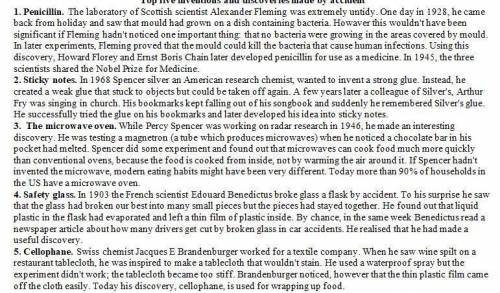Complete the sentences using information from the text:
1. If Alexander Fleming hadn`t been so messy, he
wouldn`t have
2. Arthur Fry wouldn`t have invented sticky notes if he
3. If Edouard Benedictus hadn`t knocked over glass
bar
4. Percy Le Baron Spencer wouldn`t
have if a chocolate bar
5. If Jacques E Brandenburger

Другие вопросы по теме Английский язык
Популярные вопросы
- СОЧ 2 ЧЕТВЕРТЬ НУЖНО СЕГОДНЯ ...
1 - Подчеркнуть уточняющие члены предложения...
1 - Как устроена устьичная щель...
3 - Выбирите слово (название профессии) с суффиксом -щик-...
3 - Ақан сері «Қыз сипаты» өлеңі Өлең үзіндісін оқы. Өлең үзіндісінен...
2 - Продолжи предложение, выбрав ответ из выпадающего списка. То, что...
3 - 1)x^2-|х-5|=5 ; 2)х^2+4х+|х+3|+3=0 решить ...
2 - Реши задачу двумя класс номер 6 и...
3 - Найти произволную функцию...
2 - Чудо света Местонахождение ...
3
To explain this to a student, you could say: Alexander Fleming was a scientist who discovered penicillin, a life-saving antibiotic. He accidentally left some bacteria culture dishes open and forgot to wash them properly. As a result, mold started growing in one of the dishes. Instead of throwing it away, he observed that the mold was killing the bacteria. This led to the discovery of penicillin, which changed the field of medicine forever. So, if Fleming hadn't been messy and had cleaned his dishes properly, he wouldn't have made this important discovery.
2. Arthur Fry wouldn't have invented sticky notes if he hadn't attended a church choir practice. To explain this to a student: Arthur Fry was a scientist who invented sticky notes, also known as Post-it notes. He used to sing in a church choir and had a problem keeping his place in the hymnal (a book with religious songs). One day, he attended a choir practice and was frustrated when his bookmark kept falling out. He later came up with the idea of using an adhesive that could stick to paper and be easily removed without leaving any residue. This led to the invention of sticky notes. If Arthur Fry hadn't gone to choir practice and faced this problem of keeping his place in the hymnal, he wouldn't have thought of inventing sticky notes.
3. If Edouard Benedictus hadn't knocked over a glass flask, shattering it, he wouldn't have invented safety glass. To explain this to a student: Edouard Benedictus was a scientist who accidentally knocked over a glass flask filled with liquid. Instead of shattering into dangerous shards, the flask broke but remained intact as one piece. This incident made him realize the need for safer glass, which led to the invention of safety glass. If Edouard Benedictus hadn't knocked over the glass flask and it hadn't remained intact, he wouldn't have thought about inventing a glass that doesn't shatter into sharp pieces upon breaking.
4. Percy Le Baron Spencer wouldn't have invented the microwave oven if a chocolate bar hadn't melted in his pocket. To explain this to a student: Percy Le Baron Spencer was an engineer who accidentally discovered the concept of microwave heating. He was working on a device called a magnetron when he noticed that a chocolate bar in his pocket had melted. He realized that the magnetron had caused the chocolate to melt due to the microwave radiation it emitted. This led to the invention of the microwave oven. If Percy Le Baron Spencer hadn't experienced the chocolate bar melting incident, he wouldn't have made the connection between magnetrons and heat, and the microwave oven wouldn't have been invented.
5. If Jacques E Brandenburger hadn't forgotten his wallet, he wouldn't have invented cellophane. To explain this to a student: Jacques E Brandenburger was a scientist who invented cellophane, a transparent wrapping material. One day, he went out for lunch and realized that he had forgotten his wallet at home. As a result, his sandwich got dirty as it wasn't protected. This incident sparked his idea of creating a transparent material that could be used as a protective wrapping. This led to the invention of cellophane. If Jacques E Brandenburger hadn't forgotten his wallet and his sandwich hadn't gotten dirty, he wouldn't have thought about inventing a transparent wrapping material like cellophane.